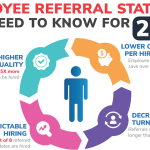How to Create an Effective Employee Referral Policy
Employee referral policies are company policies that encourage or incentivize current employees to refer qualified candidates for job openings within the organization.
These policies can be an effective way to source and hire top talent. Employee referrals have some compelling numbers.
They tend to result in higher-quality candidates, who stay longer and perform better than candidates sourced through other methods.
Employee Referral Policy Ideas
Incentives – Many companies offer rewards or bonuses to employees who refer successful candidates. These incentives can be in the form of cash bonuses, gift cards, extra time off, etc.
Eligibility criteria – Companies may have certain criteria that a referred candidate must meet in order for the employee who made the referral to receive the incentive. For example, the referred candidate may need to be hired and stay on the job for a certain period of time.
Referral process – Companies typically have a process in place for employees to submit referrals. This may involve an online form, an email to HR, or a referral tracking system.
Communication – Companies should communicate the referral policy clearly to employees. This includes communicating the incentives available, the eligibility criteria, and the referral process. Regular reminders/updates will also help keep the policy top of mind for employees.
What are the benefits of having an employee referral policy?
There are several benefits to having an employee referral policy, including:
Higher-quality candidates – Employee referrals tend to be more qualified and better aligned.
Lower cost per hire –Referral programs can be a cost-effective way to source and hire new employees. They typically are less expensive than sourcing candidates through other means.
Improved retention – Referred candidates tend to stay with the company longer, which can lead to reduced turnover and associated costs.
Stronger employee engagement –Employees who participate in referral programs tend to feel more engaged and invested in the company’s success.
Employee Referral Policy Disadvantages
There are also some potential drawbacks to employee referral policies, such as:
Lack of diversity – If employees primarily refer people from their own networks, this can lead to a lack of diversity in the candidate pool.
Nepotism: – Referral programs can be perceived as favoring employees who have personal connections to decision-makers, rather than the most qualified candidates.
Inequitable rewards – If the rewards for successful referrals are not distributed fairly, this can lead to resentment and low morale among employees.
To maximize the benefits of an employee referral policy and minimize the potential drawbacks, companies should design their policies carefully and implement them transparently and fairly. Check out our page which talks about how you can streamline and automate your employee referral program efforts.
Employee Referral Policy Guide
If you’re interested in gaining more robust insights into creating an effective employee referral policy, download our free eBook here.







